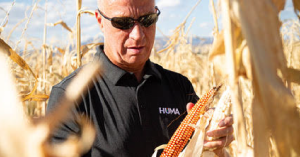Last week my wife and I frequented a rather posh coffee shop in Gilbert, AZ. I was wearing my “God Made a Farmer” t-shirt, likely not common attire for such a place. Yet the number of compliments I received about it was astounding. The well-to-do clientele ranged from fancy-iced-coffee-drinking twenty somethings to retired couples. But the tenor of their comments was similar: genuine admiration for the world’s greatest profession. It’s highly unlikely the young people ever heard of Paul Harvey, who made famous the term “God Made a Farmer.” Some cited having family roots in farming, others just like the concept of supporting those who grow their food. In a 2020 Gallup poll, farming ranked #1 as the most positively viewed industry, which indicates an admiration for farmers. Yes, there are still plenty of unfounded misconceptions about farming, which I call out in this blog. And the ag industry has lots of work to do in terms of education. But the number of positive comments I received from the coffee shop crowd were as refreshing and stimulating as the drinks we enjoyed.
Yesterday was Earth Day. This is one of the original “days” dedicated to cause marketing. It’s come a long way in the past 54 years – evidenced by the fact that as a kindergartener I brought home a tree sampling… in a Styrofoam cup! The movement has evolved from planting trees, to recycling, to becoming the planet’s largest civic event, celebrated by over a billion people. At Huma, every day is Earth Day. Our natural, humic-based products are earth-friendly. We are fortunate to have a dedicated Sustainability Officer, Larry Cooper, who educates our staff on earth-smart practices. Because sustainability isn’t just good for the environment, it’s also good for business. For both Huma and our customers.
My preparation for #Plant24 has begun. Last week we applied the dry humate product K Hume to my farm, at 200# per acre. The Falaya soil found in west Tennessee has an organic matter of 1.5% and a CEC of 5.1. That’s a far cry from the fertile black soils I farmed back in Illinois. The dry humate will help improve my soil health, which will lead to more productive crops.
E15 – a 15% ethanol blended fuel (vs. the standard 10% ethanol blend used in over 90% of all gas sold in the USA) – is now approved for sale this summer. This marks the third year in a row that E15 has received an EPA waiver for summer sale. E15 has been banned from June 1 to September 15 due to an outdated study that suggested the corn-based fuel could cause air pollution during the summer months (further studies have shown no evidence to support this claim). The move is hailed as an attempt to avoid potential supply chain disruptions due to the Russia-Ukraine conflict. EPA administrator Michael Regan cited “no significant change in air pollution is projected to occur as a result of this action.” E15 is currently offered at more than 3,000 service stations, mainly in the Midwest. Retailers do find it challenging to stock and separate a fuel product that isn’t approved for year-round use, which has been a stumbling block for increasing E15 distribution. Two years ago, governors from eight Midwest states petitioned the government to lift the ban. It was recently granted, but not until 2025. Now, the summer lift essentially means year-round access is now full time in those states. Now for the remaining 42 states…
Related Posts

This Week in Ag #50
When explaining the carbon offset market, many of you have heard me give the example of companies and individuals purchasing carbon credits to “offset” their carbon footprints. By nature of what they do, some businesses such as airlines have no choice, as they’ll otherwise never come close to meeting self-imposed carbon footprint targets.

This Week in Ag #6
Tomorrow is National Ag Day! Just like Huma, Inc., National Ag Day is enjoying its golden anniversary. The day is dedicated to celebrating and raising awareness for how our food, fiber (and energy) is produced. This year’s theme is “Growing a Climate for Tomorrow.” Agriculture is the USA’s largest employer, responsible for 23 million jobs –

This Week in Ag #39
Clocks turned back one hour in most of the country over the weekend (a notable exception was Arizona). There’s a popular belief that daylight savings time was intended for farmers. Agriculturists are, of course, infamous early risers, said to awaken with the roosters to do their daily chores. Contrary to popular belief, the idea to “fall

